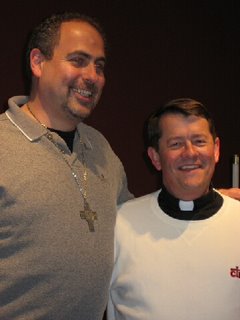20070428
20070427
20070426
20070424
20070423
Arived at Christ the King in NY
20070420
20070419
20070418
20070417
Christ the King Center



I am very much looking forward to my time at Christ the King Center. I will be in the level one traing on healing. I will also be getting away from my life in PA and this wil sereve as a much needed break and respit. This subject of prayer and healing has been on my heart for some years and I will finally take a class/ traing in this practice. I will be posting some info while I am up there if there is internet. I will also be comming back to AC New Jersey and talk on Faith and Intervention at the NJ EAP Confrence. God bless us all and our Nation.
Healing Ministry.....School of Healing
The School of Healing Prayer is a comprehensive program designed to train individuals for the ministry of healing in their home church. This is a three part program: Level 1, Level 2, and Level 3. Each level provides specific education and experience discussing in-depth the healing power of Jesus Christ. The core teaching for each level is based on the video presentations of Francis MacNutt, Director of the Christian Healing Ministry in Jacksonville, Florida.
Subjects discussed in the School of Healing Prayer
LEVEL 1
Introduction to Healing is a gift of God. Examines the way Jesus healed and how He passed along His healing power to His disciples.Four Types of Healing Physical Healing, Inner Healing, Salvation or Spiritual Healing and deliverance from evil spirits.
Physical Healing How to pray for physical healing and important points relating to physical healing.
Inner Healing How as prayer ministries we can help others through prayer to receive healing of memories and emotions that hold them in bondage.
Inner Healing and Forgiveness Prayers Practical considerations and guidelines for praying for inner healing and forgiveness.
Salvation and Baptism in the Holy Spirit. Practical guidelines for discussing salvation with those to whom we minister and discusses Baptism in the Holy Spirit, What it is and how it differs from salvation. It explains the gifts of the Holy Spirit and how these gifts can impact prayer for healing.
Introduction to Prayer Ministry Requirements for those who serve as prayer ministers and covers the different types of prayer ministry. Guidelines are given for performing prayer ministry.
Conducting the Initial Interview This lesson gives practical procedures, applications and guidelines to follow, when ministering with a client. It emphasizes the importance of listening, loving, and praying, as Jesus would do.
Conception to Birth Prayer Explains why praying for healing of anything that occurred from conception to birth is an important aspect of inner healing.
Renouncing Occult Involvement The spiritual dangers of occult involvement and the need for healing of individuals who participate in occult activities.
Generational Healing The Biblical basis for generational bondage and how to prayer for generational healing.
Developing Prayer Teams & Intercessory Prayer Guidelines for organizing your prayer ministry and discusses the importance of intercessory prayer. Helpful tools for intercessors are highlighted.
20070416
Snow in PA today
Went out to work today around 7:00am and there was snow and slush ice and rain all over. I had to brush snow and slush off the car and took and extra 30 min to get to work. Well it looks like the winter is trying to hang on. I took a pic of the weather but it did not capture the snow very well, just that it was wet. Its aoutn 12:30 now and the snow has stoped but it is very windy and bla out the windo.
20070411
20070410
20070409
100 Million iPods Sold

Courtesy of Apple
CUPERTINO, California—April 9, 2007—Apple® today announced that the 100 millionth iPod® has been sold, making the iPod the fastest selling music player in history. The first iPod was sold five and a half years ago, in November 2001, and since then Apple has introduced more than 10 new iPod models, including five generations of iPod, two generations of iPod mini, two generations of iPod nano and two generations of iPod shuffle. Along with iTunes® and the iTunes online music store, the iPod has transformed how tens of millions of music lovers acquire, manage and listen to their music.
“At this historic milestone, we want to thank music lovers everywhere for making iPod such an incredible success,” said Steve Jobs, Apple’s CEO. “iPod has helped millions of people around the world rekindle their passion for music, and we’re thrilled to be a part of that.”
“It’s hard to remember what I did before the iPod,” said Mary J. Blige, GRAMMY Award-winning singer. “iPod is more than just a music player, it’s an extension of your personality and a great way to take your favorite music with you everywhere you go.”
“Without the iPod, the digital music age would have been defined by files and folders instead of songs and albums,” said John Mayer, GRAMMY Award-winning singer-songwriter and guitarist. “Though the medium of music has changed, the iPod experience has kept the spirit of what it means to be a music lover alive."
The iPod has also sparked an unprecedented ecosystem of over 4,000 accessories made specifically for the iPod that range from fashionable cases to speaker systems, and more than 70 percent of 2007-model US automobiles currently offer iPod connectivity.
“I take my running shoes and my iPod with me everywhere,” said Lance Armstrong, seven-time Tour de France champion. “I listen to music when I run. Having my music with me is really motivating.”
Every iPod features seamless integration with iTunes 7. The iTunes Store (www.itunes.com) features the world’s largest catalog with over five million songs, 350 television shows and over 400 movies. The iTunes Store has sold over 2.5 billion songs, 50 million TV shows and over 1.3 million movies, making it the world’s most popular online music, TV and movie store.
Apple ignited the personal computer revolution in the 1970s with the Apple II and reinvented the personal computer in the 1980s with the Macintosh. Today, Apple continues to lead the industry in innovation with its award-winning computers, OS X operating system and iLife and professional applications. Apple is also spearheading the digital media revolution with its iPod portable music and video players and iTunes online store, and will enter the mobile phone market this year with its revolutionary iPhone.
Press Contacts:
Tom Neumayr
Apple
tneumayr@apple.com
(408) 974-1972
Christine Monaghan
Apple
cmonaghan@apple.com
(408) 974-8850
20070408
20070407
The Word of the Cross Dr. N.T. Wright
The Word of the Cross
1 Corinthians 1.18
[Isaiah 61.1–9; James 5.13–16a; Luke 4.16–20]
a sermon at the Sung Eucharist with the Blessing of Oils and Renewal of Ordination Vows
Durham Cathedral, Maundy Thursday, 5 April 2007
by the Bishop of Durham, Dr N. T. Wright
‘For the word of the cross is folly to those who are perishing, but to us who are being saved it is the power of God.’ Paul’s classic challenge to the wisdom of the world echoes down the centuries and confronts us once more as we come face to face once more with the great events which not only stand at the heart of our faith but are etched into our geography and architecture, as this great building makes clear. One of the paradoxical signs of the continuing and urgent relevance of the message and meaning of the cross is that it is once more under attack from several directions; and we who today declare that we will be true to our ordination vows, and who will this evening and tomorrow commemorate those high and holy, disturbing and decisive events in the story of Jesus himself, must take a deep breath, summon up our courage, and learn again what it means to discover the wisdom of God in what the world counts foolishness, the power of God in what the world counts weakness.
The first challenge comes from within, in the temptation to water down the message of the cross so that it becomes less offensive, more palatable to the ordinary sensible mind. We must of course acknowledge that many, alas, have offered caricatures of the biblical theology of the cross. It is all too possible to take elements from the biblical witness and present them within a controlling narrative gleaned from somewhere else, like a child doing a follow-the-dots puzzle without paying attention to the numbers and producing a dog instead of a rabbit. This is what happens when people present over-simple stories, as the mediaeval church often did, followed by many since, with an angry God and a loving Jesus, with a God who demands blood and doesn’t much mind whose it is as long as it’s innocent. You’d have thought people would notice that this flies in the face of John’s and Paul’s deep-rooted theology of the love of the triune God: not ‘God was so angry with the world that he gave us his son’ but ‘God so loved the world that he gave us his son’. That’s why, when I sing that interesting recent song and we come to the line, ‘And on the cross, as Jesus died, the wrath of God was satisfied’, I believe it’s more deeply true to sing ‘the love of God was satisfied’, and I commend that alteration to those of you who sing that song, which is in other respects one of the very few really solid recent additions to our repertoire.
But once we’ve got rid of the caricature, we are ready to face the reality, the reality of the foolishness and weakness, but in fact the wisdom and the power, of the cross of Jesus Christ. When Paul declares, equally famously, that there is ‘no condemnation for those who are in Christ Jesus’, he doesn’t say ‘because after all God wasn’t into condemning things, there was never any question of his being wrathful or angry, that’s a barbaric old-fashioned myth’. No. At the heart of the complex explanation Paul gives in the next two verses for why there is no condemnation, we find this central statement in which we find the life and peace of the gospel itself: ‘For God has done what the law . . . could not do: sending his own Son in the likeness of sinful flesh and as a sin-offering, he condemned sin in the flesh.’ Precisely out of his fathomless love the creator God sent his own Son not simply to share in the mess and muddle of our human existence, but to take upon himself the task of being the place where God would pass judicial sentence upon sin itself, sin as a fact, sin as a deadly power, sin as the poisonous snake whose bite means death itself. Please note, Paul doesn’t say that God condemned Jesus Christ. He says that God condemned sin in the flesh of Jesus Christ. As the Archbishop of Canterbury says in his new book, ‘[Christ] becomes a sort of embodied image for what we are; and he takes on himself the curse that is laid on us.’ Now if you put that truth into other narratives – the story of an angry old man, the story of an offended mediaeval nobleman, the story of a judge imposing a heavy fine – and you will distort it. But to deny the truth because of the distortions is to cut out the heart because the patient is bleeding. The word of the cross is folly to those who are perishing, but to us who are being saved it is the power of God.
Face it: to deny God’s wrath is, at bottom, to deny God’s love. When God sees humans being enslaved – and do please go and see the film Amazing Grace as soon as you get the change – if God doesn’t hate it, he is not a loving God. (It was the sneering, sophisticated set who tried to make out that God didn’t get angry about that kind of thing, and whom Wilberforce opposed with the message that God really does hate slavery.) When God sees innocent people being bombed because of someone’s political agenda, if God doesn’t hate it, he isn’t a loving God. When God sees people lying and cheating and abusing one another, exploiting and grafting and preying on one another, if God were to say, ‘never mind, I love you all anyway’, he is neither good nor loving. The Bible doesn’t speak of a God of generalized benevolence. It speaks of the God who made the world and loves it so passionately that he must and does hate everything that distorts and defaces the world and particularly his human creatures. And the Bible doesn’t tell an abstract story about people running up a big debit balance in God’s bank and God suddenly, out of the blue, charging the whole lot to Jesus. The Bible tells a story about the creator God calling a people through whom he would put the world right, living with that covenant people even when they themselves went wrong, allowing them to become the place where the power of evil would do its worst, and preparing them all through for the moment when, like the composer finally stepping on stage to play the solo part, he would come and take upon himself, in the person of his Son, the pain and shame, yes, the horror and darkness, yes, but also, in Matthew, Mark, Luke and John, in Paul and Acts and Hebrews and 1 Peter and Revelation, in Ignatius and Irenaeus and Augustine and Aquinas, in Luther and Calvin and Cranmer and Hooker, in Herbert and Donne and and Wesley and Watts – he would take upon himself the condemnation which, precisely because he loves us to the uttermost, he must pronounce over that deadly disease we call sin. To deny this, as some would do today as they have for hundreds of years, is to deny the depth and weight of sin and the deeper depth and heavier weight of God’s redeeming love. The word of the cross is folly to those who are perishing, but to us who are being saved it is the power of God.
And when we have grasped that, and clung on to it for dear life, we are ready to face the further challenge issued by the sneering secular sceptic. I have in mind this morning’s article, typical of its author and increasingly of its context, by Matthew Parris in the Times. ‘Where are you. intelligent Christians?’ he asks. ‘Where is your voice, your righteous anger? Where is your honest contempt for this nonsense?’ I thought, when I read this in a headline, that he was urging us to protest about Ken Livingstone’s plan to build a massive mosque at taxpayers’ expense. But no. He is asking us to rise up in sceptical, ‘intelligent’ critique of the notion that a nun has been cured of Parkinson’s through a written prayer to the late John Paul II. OK, he couples this with a call for us to reject the right-wing American ideology which gives uncritical support to the modern State of Israel because of particular beliefs about the second coming. I for one have frequently spoken out against that on both sides of the Atlantic. And I grant you that not all of us are, shall we say, entirely comfortable with the rather mechanical notion both of healing and of sainthood which calculates the latter in terms of the former. But Matthew Parris, like so many late-modern sceptics, is appealing to an ‘intelligence’ which is of course entirely defined within his own worldview. He begins his article with a remarkable comment to the effect that people during Holy Week are telling us that religion is all about shared moral values, making the world a better place and gaining a proper sense of awe at life’s mystery, and that all the great world religions are really fumbling towards the same truth. Well, I don’t know which preachers he’s been listening to, but that’s not why we’re here this morning. That soggy relativism isn’t new; it’s basically the eighteenth-century Deist belief in a distant God and a generalized religious awareness. It’s got nothing to do with the death and resurrection of Jesus Christ, which is the only reason why there’s a ‘Holy Week’ in the first place.
So when Matthew Parris says that ‘this is the century during which, after 2,000 years of what has been a pretty bloody marriage, faith and reason must agree to part, citing irreconcilable differences,’ we must make two comments. First, faith is not a thing in itself. It is like a window in a house, defined not in terms of its type of glass but in terms of what you can see through it. And what Christian faith sees is the God who loved the world so much that he sent his son to die and rise again and thereby to redefine for all time what is true and what isn’t, what is wise and what isn’t, what is weak and what is powerful and what is deadly and what is salvific. And, second, as today and tomorrow we hold our gaze through that window on that God, we learn to meet the sneer of the sceptic not by hiding in a corner and taking refuge in unreason or anti-reason, but by seeing reason itself in the light of the cross. The word of the cross is folly to those who are perishing, but to us who are being saved it is the wisdom of God and the power of God. As Paul goes on to say, among the mature we do teach wisdom, but it is a redefined wisdom which confronts the sceptical powers of the world and declares to them that in crucifying Jesus they have signed their own death warrant.
And that defeat of the powers is basically why, today, we bless the oils which will be used in the church’s ministry of healing. I don’t know why God heals (well, he heals because he is the loving creator; but I don’t know why he heals here but not there, this person but not that) or how God heals, but I am 100% clear that God heals, and that he often uses the ministry of the church, obeying the scriptural command of James, in that work. The great message of Isaiah, reiterated in Jesus’ manifesto in Luke 4, is all about the new creation which results from God’s saving work; and these oils flow, as it were, from our great commemoration of God’s love today and tomorrow in this mother church, out into the world of sorrow and disease all around, as a sign that God is God, that the forces of darkness and death were defeated on the cross, and that through the healing cross and the power of Jesus’ resurrection and his life-giving Spirit God can and does do all kinds of things in answer to his people’s prayers. And I’ll tell you something. I don’t much care for praying to saints in order then to rank them according to their apparent power. That has always been a rather odd idea. But you know what? If I had to choose between John Paul II and Matthew Parris to tell me real meaning of life, Parris wouldn’t have a prayer. The word of the cross is folly to those who are perishing, but to us who are being saved it is the power of God.
And finally but importantly, when deacons, priests and bishops stand up in a few minutes and renew their ordination vows, this entire event is either defined by the folly and power of the cross or it is nothing. I have nothing but delight and gratitude for the hundreds of readers, lay ministers, churchwardens and other wonderful lay folk through whom the work of the church goes on day by day and week by week. We clergy aren’t the church; the people are the church, and we are their servants. But it is precisely because of that cross-shaped and cross-demonstrating servant ministry that ordination vows are rightly solemn, tough and binding. I didn’t invent this service of reaffirmation of clergy vows, and as I said in my letter to the clergy I would in some ways rather do a service for everyone somewhere around Pentecost. That’s a debate to be continued. But the meaning of what we do here today is to reaffirm the serious, life-changing and lifelong promises we have made to God and to his people, that we will be publicly marked out as cross-shaped, cross-bearing, cross-preaching, cross-glorying people.
This is not about ‘me and my ministry’, or about a small elite patting itself on the back. It is about strengthening and reaffirming one another and ourselves in our lifelong identity as those set apart by God and his church to be people of the word, people of the sacraments, people of the cross, the resurrection and the Spirit and the cross again, people who say by their very existence – despite the challenges and the frustrations and the weariness and the share increases and the pastoral reorganisation and the leaky roof and the debates in General Synod – people who say by their very existence that the word of the cross is folly to those who are perishing, but to us who are being saved, and to us, please God, through whom the fact of that salvation goes out into the world, it is the power of God and the wisdom of God. My brothers and sisters, here is the cross of Jesus Christ. Take it, in the bread and the wine. Take its power and sweetness in the oil of healing, of baptism, of chrism. Preach it; live it; be it – for the world that still waits to see what wisdom and power really mean.The Wor
1 Corinthians 1.18
[Isaiah 61.1–9; James 5.13–16a; Luke 4.16–20]
a sermon at the Sung Eucharist with the Blessing of Oils and Renewal of Ordination Vows
Durham Cathedral, Maundy Thursday, 5 April 2007
by the Bishop of Durham, Dr N. T. Wright
‘For the word of the cross is folly to those who are perishing, but to us who are being saved it is the power of God.’ Paul’s classic challenge to the wisdom of the world echoes down the centuries and confronts us once more as we come face to face once more with the great events which not only stand at the heart of our faith but are etched into our geography and architecture, as this great building makes clear. One of the paradoxical signs of the continuing and urgent relevance of the message and meaning of the cross is that it is once more under attack from several directions; and we who today declare that we will be true to our ordination vows, and who will this evening and tomorrow commemorate those high and holy, disturbing and decisive events in the story of Jesus himself, must take a deep breath, summon up our courage, and learn again what it means to discover the wisdom of God in what the world counts foolishness, the power of God in what the world counts weakness.
The first challenge comes from within, in the temptation to water down the message of the cross so that it becomes less offensive, more palatable to the ordinary sensible mind. We must of course acknowledge that many, alas, have offered caricatures of the biblical theology of the cross. It is all too possible to take elements from the biblical witness and present them within a controlling narrative gleaned from somewhere else, like a child doing a follow-the-dots puzzle without paying attention to the numbers and producing a dog instead of a rabbit. This is what happens when people present over-simple stories, as the mediaeval church often did, followed by many since, with an angry God and a loving Jesus, with a God who demands blood and doesn’t much mind whose it is as long as it’s innocent. You’d have thought people would notice that this flies in the face of John’s and Paul’s deep-rooted theology of the love of the triune God: not ‘God was so angry with the world that he gave us his son’ but ‘God so loved the world that he gave us his son’. That’s why, when I sing that interesting recent song and we come to the line, ‘And on the cross, as Jesus died, the wrath of God was satisfied’, I believe it’s more deeply true to sing ‘the love of God was satisfied’, and I commend that alteration to those of you who sing that song, which is in other respects one of the very few really solid recent additions to our repertoire.
But once we’ve got rid of the caricature, we are ready to face the reality, the reality of the foolishness and weakness, but in fact the wisdom and the power, of the cross of Jesus Christ. When Paul declares, equally famously, that there is ‘no condemnation for those who are in Christ Jesus’, he doesn’t say ‘because after all God wasn’t into condemning things, there was never any question of his being wrathful or angry, that’s a barbaric old-fashioned myth’. No. At the heart of the complex explanation Paul gives in the next two verses for why there is no condemnation, we find this central statement in which we find the life and peace of the gospel itself: ‘For God has done what the law . . . could not do: sending his own Son in the likeness of sinful flesh and as a sin-offering, he condemned sin in the flesh.’ Precisely out of his fathomless love the creator God sent his own Son not simply to share in the mess and muddle of our human existence, but to take upon himself the task of being the place where God would pass judicial sentence upon sin itself, sin as a fact, sin as a deadly power, sin as the poisonous snake whose bite means death itself. Please note, Paul doesn’t say that God condemned Jesus Christ. He says that God condemned sin in the flesh of Jesus Christ. As the Archbishop of Canterbury says in his new book, ‘[Christ] becomes a sort of embodied image for what we are; and he takes on himself the curse that is laid on us.’ Now if you put that truth into other narratives – the story of an angry old man, the story of an offended mediaeval nobleman, the story of a judge imposing a heavy fine – and you will distort it. But to deny the truth because of the distortions is to cut out the heart because the patient is bleeding. The word of the cross is folly to those who are perishing, but to us who are being saved it is the power of God.
Face it: to deny God’s wrath is, at bottom, to deny God’s love. When God sees humans being enslaved – and do please go and see the film Amazing Grace as soon as you get the change – if God doesn’t hate it, he is not a loving God. (It was the sneering, sophisticated set who tried to make out that God didn’t get angry about that kind of thing, and whom Wilberforce opposed with the message that God really does hate slavery.) When God sees innocent people being bombed because of someone’s political agenda, if God doesn’t hate it, he isn’t a loving God. When God sees people lying and cheating and abusing one another, exploiting and grafting and preying on one another, if God were to say, ‘never mind, I love you all anyway’, he is neither good nor loving. The Bible doesn’t speak of a God of generalized benevolence. It speaks of the God who made the world and loves it so passionately that he must and does hate everything that distorts and defaces the world and particularly his human creatures. And the Bible doesn’t tell an abstract story about people running up a big debit balance in God’s bank and God suddenly, out of the blue, charging the whole lot to Jesus. The Bible tells a story about the creator God calling a people through whom he would put the world right, living with that covenant people even when they themselves went wrong, allowing them to become the place where the power of evil would do its worst, and preparing them all through for the moment when, like the composer finally stepping on stage to play the solo part, he would come and take upon himself, in the person of his Son, the pain and shame, yes, the horror and darkness, yes, but also, in Matthew, Mark, Luke and John, in Paul and Acts and Hebrews and 1 Peter and Revelation, in Ignatius and Irenaeus and Augustine and Aquinas, in Luther and Calvin and Cranmer and Hooker, in Herbert and Donne and and Wesley and Watts – he would take upon himself the condemnation which, precisely because he loves us to the uttermost, he must pronounce over that deadly disease we call sin. To deny this, as some would do today as they have for hundreds of years, is to deny the depth and weight of sin and the deeper depth and heavier weight of God’s redeeming love. The word of the cross is folly to those who are perishing, but to us who are being saved it is the power of God.
And when we have grasped that, and clung on to it for dear life, we are ready to face the further challenge issued by the sneering secular sceptic. I have in mind this morning’s article, typical of its author and increasingly of its context, by Matthew Parris in the Times. ‘Where are you. intelligent Christians?’ he asks. ‘Where is your voice, your righteous anger? Where is your honest contempt for this nonsense?’ I thought, when I read this in a headline, that he was urging us to protest about Ken Livingstone’s plan to build a massive mosque at taxpayers’ expense. But no. He is asking us to rise up in sceptical, ‘intelligent’ critique of the notion that a nun has been cured of Parkinson’s through a written prayer to the late John Paul II. OK, he couples this with a call for us to reject the right-wing American ideology which gives uncritical support to the modern State of Israel because of particular beliefs about the second coming. I for one have frequently spoken out against that on both sides of the Atlantic. And I grant you that not all of us are, shall we say, entirely comfortable with the rather mechanical notion both of healing and of sainthood which calculates the latter in terms of the former. But Matthew Parris, like so many late-modern sceptics, is appealing to an ‘intelligence’ which is of course entirely defined within his own worldview. He begins his article with a remarkable comment to the effect that people during Holy Week are telling us that religion is all about shared moral values, making the world a better place and gaining a proper sense of awe at life’s mystery, and that all the great world religions are really fumbling towards the same truth. Well, I don’t know which preachers he’s been listening to, but that’s not why we’re here this morning. That soggy relativism isn’t new; it’s basically the eighteenth-century Deist belief in a distant God and a generalized religious awareness. It’s got nothing to do with the death and resurrection of Jesus Christ, which is the only reason why there’s a ‘Holy Week’ in the first place.
So when Matthew Parris says that ‘this is the century during which, after 2,000 years of what has been a pretty bloody marriage, faith and reason must agree to part, citing irreconcilable differences,’ we must make two comments. First, faith is not a thing in itself. It is like a window in a house, defined not in terms of its type of glass but in terms of what you can see through it. And what Christian faith sees is the God who loved the world so much that he sent his son to die and rise again and thereby to redefine for all time what is true and what isn’t, what is wise and what isn’t, what is weak and what is powerful and what is deadly and what is salvific. And, second, as today and tomorrow we hold our gaze through that window on that God, we learn to meet the sneer of the sceptic not by hiding in a corner and taking refuge in unreason or anti-reason, but by seeing reason itself in the light of the cross. The word of the cross is folly to those who are perishing, but to us who are being saved it is the wisdom of God and the power of God. As Paul goes on to say, among the mature we do teach wisdom, but it is a redefined wisdom which confronts the sceptical powers of the world and declares to them that in crucifying Jesus they have signed their own death warrant.
And that defeat of the powers is basically why, today, we bless the oils which will be used in the church’s ministry of healing. I don’t know why God heals (well, he heals because he is the loving creator; but I don’t know why he heals here but not there, this person but not that) or how God heals, but I am 100% clear that God heals, and that he often uses the ministry of the church, obeying the scriptural command of James, in that work. The great message of Isaiah, reiterated in Jesus’ manifesto in Luke 4, is all about the new creation which results from God’s saving work; and these oils flow, as it were, from our great commemoration of God’s love today and tomorrow in this mother church, out into the world of sorrow and disease all around, as a sign that God is God, that the forces of darkness and death were defeated on the cross, and that through the healing cross and the power of Jesus’ resurrection and his life-giving Spirit God can and does do all kinds of things in answer to his people’s prayers. And I’ll tell you something. I don’t much care for praying to saints in order then to rank them according to their apparent power. That has always been a rather odd idea. But you know what? If I had to choose between John Paul II and Matthew Parris to tell me real meaning of life, Parris wouldn’t have a prayer. The word of the cross is folly to those who are perishing, but to us who are being saved it is the power of God.
And finally but importantly, when deacons, priests and bishops stand up in a few minutes and renew their ordination vows, this entire event is either defined by the folly and power of the cross or it is nothing. I have nothing but delight and gratitude for the hundreds of readers, lay ministers, churchwardens and other wonderful lay folk through whom the work of the church goes on day by day and week by week. We clergy aren’t the church; the people are the church, and we are their servants. But it is precisely because of that cross-shaped and cross-demonstrating servant ministry that ordination vows are rightly solemn, tough and binding. I didn’t invent this service of reaffirmation of clergy vows, and as I said in my letter to the clergy I would in some ways rather do a service for everyone somewhere around Pentecost. That’s a debate to be continued. But the meaning of what we do here today is to reaffirm the serious, life-changing and lifelong promises we have made to God and to his people, that we will be publicly marked out as cross-shaped, cross-bearing, cross-preaching, cross-glorying people.
This is not about ‘me and my ministry’, or about a small elite patting itself on the back. It is about strengthening and reaffirming one another and ourselves in our lifelong identity as those set apart by God and his church to be people of the word, people of the sacraments, people of the cross, the resurrection and the Spirit and the cross again, people who say by their very existence – despite the challenges and the frustrations and the weariness and the share increases and the pastoral reorganisation and the leaky roof and the debates in General Synod – people who say by their very existence that the word of the cross is folly to those who are perishing, but to us who are being saved, and to us, please God, through whom the fact of that salvation goes out into the world, it is the power of God and the wisdom of God. My brothers and sisters, here is the cross of Jesus Christ. Take it, in the bread and the wine. Take its power and sweetness in the oil of healing, of baptism, of chrism. Preach it; live it; be it – for the world that still waits to see what wisdom and power really mean.The Wor
20070406
20070405
20070404
Church of St. John the Divine
Church of St. John the Divine
Originally uploaded by lightgazer.
This photographer is absolutly amizing check out his pic's
20070403
Subscribe to:
Posts (Atom)









































